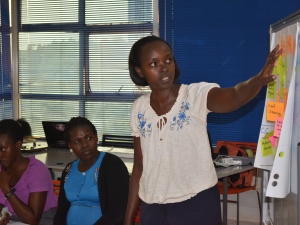The WOPA program demystified technology for me

Laura Walusimbi is a journalist with over 15 years experience. I worked with the Daily Monitor for two years. I then started a newspaper with a couple of other journalists.
In 2000, I joined Uganda Telecom and worked in various positions in the customer care and sales departments. In 2007 I resigned and resumed journalism on a freelance basis.
Currently, I write social commentary (feature-length articles) for both New Vision and Monitor. I am also a freelance editor and have done work for Fountain Publishers, National Curriculum Development Centre and individual authors.
I am a mother of two talented boys, aged 10 and 7, who recently discovered and are passionate about Scratch - a free programming language and online community where you can create and share your own interactive stories, games, and animations.
I applied for the Women Passion (WOPA) program at Outbox after receiving an email from a family friend in mid March. The email forward described the program as an experiential-based learning program supported by Google for Entrepreneurs under the #40Forward initiative. I liked that Google was involved because that meant that it was a serious program.
I was immediately drawn to the program’s aim to train up to 100 women (university and post-university) in programming and entrepreneurship skills. It did not quite matter whether you had an educational background in either – because I had little of one and none of the other. What mattered was the passion for either technology or entrepreneurship or both, and, as it later turned out, a passion to make our world a better place to live in.
I made the first cut and was called to a meeting at Outbox for a briefing about the program. I was amazed by the enthusiasm of the other participants. Although we were told we would be split into groups of 25 for four cohorts, everyone behaved like they had won the lottery. A couple of months later, I received an email inviting me to be a part of the first cohort.
I was eager to learn how the program would help us use technology and business for social innovation in our communities using our passion and interests. Not surprisingly, the passion in the room that day was palpable. It seemed to me like everyone knew everyone else – facilitators and participants alike. Perhaps it had something to do with the fact that most of the young ladies were university students of Computer Science, Software Engineering, or some other such program and a number of them were members of an outfit called Girl Geek, which is a story for another day. I resolved to learn as much as I could in the twelve weeks the program would run.
The more I interacted with the ladies on the program and the more I learnt, the more I realized the program would help me help others too. There are two things I will not forget in a hurry - Human-Centred Design (HCD) and programming. HCD taught me there is more to starting up a business than just having the capital and general knowledge. It places people at the centre of the design process while, among other things, emphasizing explicit understanding of users, tasks and environments. Programming on the other hand helped confirm that it is not just for geeks. At the beginning most of the jargon invariably sounded like Greek to me but within a short time some of the ladies on the program were consulting ME for help! I’m happy I can create a blog/web framework from scratch, using programming basics and fundamentals – Python, Django, Github and Heroku.
I am more confident about technology. The WOPA program demystified technology for me, so much so that I will not be tongue tied in a room full of techies any more. I will continue to avidly pursue as much information about it as I can, especially what technology can do to make our world a better place. I will use what I have learnt to encourage more people – young and old alike - to make technology a part of their lives for social innovation and not just for entertainment. Whereas most of the current generation is more tech savvy than previous ones, they are more about the latest gadgets, games and apps. Not everyone needs to be a computer wiz or ‘deadly’ dev but we can build a community of say students, NGOs, scientists, teachers, journalists, developers, and business analysts – both male and female - all working together to solve the world’s problems using HCD and software development. There are many examples of where this has worked around the world – and there is no reason why we should not passionately apply this to solve Uganda’s problems too.
One highlight of this program was meeting Megan Smith, the Google[x] vice president. Google[x]’s research and development program has developed crazy moonshot technology like self-driving cars, internet balloons and Google Glass. Smith is a woman passionate about all things tech and about people’s ability to harness this to make the world a “radically better place” to live in. In her words, when you find your passion you will be unstoppable, you will do anything.
Women Passion program is currently accepting applications to it's second intake. Apply NOW!!
About the Women Passion program
WOPA is an experiential learning program that seeks to equip women and girls with skills in programming and entrepreneurship. Each intake is 12 weeks and participants receive training in Human Centered design, Lean Startup methodology and web based programming.
WOPA is supported by Google for Entrepreneurs under the #40Forward initiative and WeTech Global under the Seed fund for Women and Girls in Computer science.
WOPA is in partnership with the Women of Uganda Network (WOUGNET)



Add new comment